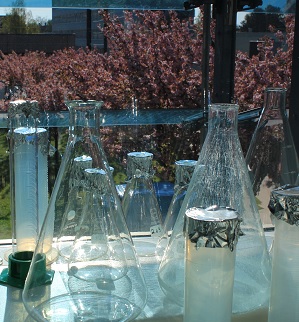
Contact
Sekretariat: Franziska Pohle
phone: 0345 / 55 - 24961
franziska.pohle@bct.uni-hal...
Kurt-Mothes-Straße 3a
06120 Halle (Saale)
1. Obergeschoss, Raum: 1.16.0
Abt. Mikrobielle Biotechnologie
Contact
Prof. Dr. Sven-Erik Behrens
Proteinforschungszentrum „Charles Tanford“
Kurt-Mothes-Straße 3a
06120 Halle
phone: 0345 / 55 - 24960
sven.behrens@biochemtech.uni-halle.de
1. Obergeschoss, Raum: 1.17.0
For approximately 15 years, the department has been researching the RNA silencing process, also known as RNA interference (RNAi). In plants, as well as in many plant pathogens and pests, including insects, RNAi is a key component of the immune response, particularly against viruses. We are investigating the functions of RNA-binding proteins, which play an essential role in RNAi. Second, we are characterizing the molecular properties of viral suppressor proteins, which can block RNA silencing in various ways. We have also developed a unique, patented technology that enables the rapid design of highly efficient, specifically effective double-stranded RNA molecules. These molecules are known as "edsRNAs" or, more generally, "RNA actives". edsRNAs can inactivate one or more target RNAs in RNA silencing. The technology has been successfully tested against various economically important viruses in the agricultural sector. There are also indications, however, of its applicability in the veterinary and human sectors. It has also recently been tested successfully against insect pests. The basic principle is that the pest's immune system is directed against its own messenger RNAs, which prevents the production of vital proteins. Currently, we are working on applications for other target organisms, as well as production and formulation processes in cooperation with others, that will enable the long-term use of edsRNAs/RNA actives, especially in agriculture. Our goal is to develop alternatives to harmful agrochemicals and respond quickly to new pests that emerge due to climate change with rapidly adapted edsRNAs/RNA actives. Our research has been and continues to be funded primarily by the German Research Foundation (DFG) through individual and collaborative projects, including two collaborative research centers (CRCs). Funding has also come from the Federal Ministry of Research, Technology, and Space (BMFTR) and various European funds. Additionally, we have collaborative projects with industry partners.




